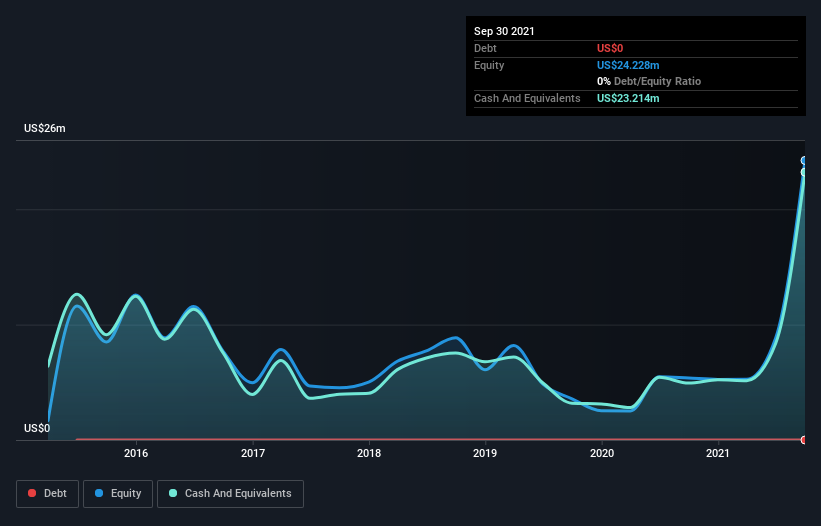- United States
- /
- Medical Equipment
- /
- NasdaqCM:NURO
Here's Why We're Not Too Worried About NeuroMetrix's (NASDAQ:NURO) Cash Burn Situation

There's no doubt that money can be made by owning shares of unprofitable businesses. For example, although Amazon.com made losses for many years after listing, if you had bought and held the shares since 1999, you would have made a fortune. But while history lauds those rare successes, those that fail are often forgotten; who remembers Pets.com?
So should NeuroMetrix (NASDAQ:NURO) shareholders be worried about its cash burn? For the purpose of this article, we'll define cash burn as the amount of cash the company is spending each year to fund its growth (also called its negative free cash flow). First, we'll determine its cash runway by comparing its cash burn with its cash reserves.
View our latest analysis for NeuroMetrix
Does NeuroMetrix Have A Long Cash Runway?
A company's cash runway is calculated by dividing its cash hoard by its cash burn. In September 2021, NeuroMetrix had US$23m in cash, and was debt-free. Looking at the last year, the company burnt through US$1.4m. So it had a very long cash runway of many years from September 2021. Even though this is but one measure of the company's cash burn, the thought of such a long cash runway warms our bellies in a comforting way. The image below shows how its cash balance has been changing over the last few years.

How Well Is NeuroMetrix Growing?
We reckon the fact that NeuroMetrix managed to shrink its cash burn by 42% over the last year is rather encouraging. Revenue also improved during the period, increasing by 13%. Considering the factors above, the company doesn’t fare badly when it comes to assessing how it is changing over time. Of course, we've only taken a quick look at the stock's growth metrics, here. You can take a look at how NeuroMetrix has developed its business over time by checking this visualization of its revenue and earnings history.
Can NeuroMetrix Raise More Cash Easily?
While NeuroMetrix seems to be in a decent position, we reckon it is still worth thinking about how easily it could raise more cash, if that proved desirable. Companies can raise capital through either debt or equity. Many companies end up issuing new shares to fund future growth. We can compare a company's cash burn to its market capitalisation to get a sense for how many new shares a company would have to issue to fund one year's operations.
Since it has a market capitalisation of US$43m, NeuroMetrix's US$1.4m in cash burn equates to about 3.3% of its market value. That's a low proportion, so we figure the company would be able to raise more cash to fund growth, with a little dilution, or even to simply borrow some money.
How Risky Is NeuroMetrix's Cash Burn Situation?
It may already be apparent to you that we're relatively comfortable with the way NeuroMetrix is burning through its cash. For example, we think its cash runway suggests that the company is on a good path. And even though its revenue growth wasn't quite as impressive, it was still a positive. After taking into account the various metrics mentioned in this report, we're pretty comfortable with how the company is spending its cash, as it seems on track to meet its needs over the medium term. Taking a deeper dive, we've spotted 3 warning signs for NeuroMetrix you should be aware of, and 1 of them is a bit unpleasant.
Of course, you might find a fantastic investment by looking elsewhere. So take a peek at this free list of companies insiders are buying, and this list of stocks growth stocks (according to analyst forecasts)
Valuation is complex, but we're here to simplify it.
Discover if NeuroMetrix might be undervalued or overvalued with our detailed analysis, featuring fair value estimates, potential risks, dividends, insider trades, and its financial condition.
Access Free AnalysisHave feedback on this article? Concerned about the content? Get in touch with us directly. Alternatively, email editorial-team (at) simplywallst.com.
This article by Simply Wall St is general in nature. We provide commentary based on historical data and analyst forecasts only using an unbiased methodology and our articles are not intended to be financial advice. It does not constitute a recommendation to buy or sell any stock, and does not take account of your objectives, or your financial situation. We aim to bring you long-term focused analysis driven by fundamental data. Note that our analysis may not factor in the latest price-sensitive company announcements or qualitative material. Simply Wall St has no position in any stocks mentioned.
About NasdaqCM:NURO
NeuroMetrix
A commercial stage neurotechnology company, engages in designing and sale of medical devices.
Flawless balance sheet low.
Similar Companies
Market Insights
Community Narratives





